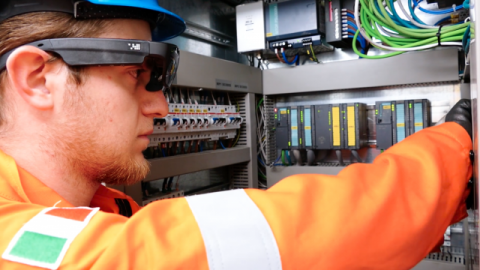
Workers can use Skylight to view documents, charts, checklists, photos, and videos without using laptops, tablets, smartphones or papers. Photo: Upskill
While Google Glass is in the early stages of attracting consumers in the consumer market, smart glasses have found real value in industrial production.
At GE Renewable Energy in Pensacola, Florida, workers in charge of assembling wind turbines are wearing smart glasses made by Upskill. Upskill is a GE venture capital firm that specializes in software for wearable smart devices.
Before using these glasses, workers often have to stop working, look at the manual or contact a specialist to make sure they assemble exactly as required. With smart glasses running on Upskill’s Skylight platform, workers can easily view digitized instructions and study them on the spot. Engineers can also watch instructional videos or use virtual voices to contact a specialist for emergency assistance. They can even directly pass personal opinions via video to show experts what they are seeing. As a result, experts can guide engineers to troubleshoot immediately and effectively.
Initial research shows that when engineers use wearable devices, labor productivity increased 34% compared to traditional working methods. Brian Ballard, Chief Executive Officer and Co-Founder of Upskill said: “GE shows the fact that we can fill the gap between the skills of workers and the demands of the company by providing full and timely information for them to work more effectively.”
Skylight is currently used in almost every unit in GE. Applications include complex assembly and manufacturing, repairs, maintenance and logistics management. For example, at GE Healthcare in Florence, South Carolina, which manufactures magnetic resonance imaging (MRI) components, workers wearing smart glasses will take orders directly from their devices. Skylight will guide workers to the right warehouse area and locate the equipment on order. Upon using Skylight for the first time, the order completion rate at GE Healthcare increased by 46%. Ballard said: “Think about how much labor productivity is going to cost when workers take the time and effort to search for these products. When you can digitize information to make it available and constantly updated in real time, you can improve labor efficiency.”
Ballard began researching supercomputers and intelligent software to combat terrorism at the National Security Center. Later, he worked at the National Science Council with the task of overseeing research on the use of virtual reality and virtual reality applications as a means of data interaction. “That is the idea that always exists in my mind,” Ballard shared.
In 2010, Ballard built APX Labs. He recently changed this lab’s name to Upskill. Initially, Upskill focused on manufacturing smart glasses for the military, but in 2014, the company turned to developing software platforms for commercial activities. A year later, the arrival of Google Glass helped raise awareness about the technology. Wearable devices such as Vuzix and Daqri were quickly completed.
Ballard said: “Everyone’s imagination is put into conversation. The challenge for a small company like us is finding a place to launch the launcher. Our goal is to focus on how the information is available in an intuitive, understandable and well-configured way to ensure that there is no disruption to existing workflows and workflows. ”In addition to GE, the company now is partnering with many Fortune 500 companies such as Boeing, Johnson & Johnson and Lockheed Martin.
Ballard’s wearable solutions are in line with GE’s vision of a super-power plant model, where technology enhances people’s ability to work. Ballard said: “When you have a super factory, you will have smart devices and digital twin. Without an intelligent workforce capable of interacting with data, the workflow would be inefficient. Our technology solves that problem and helps everyone participate in that data exchange process.”
Ballard believes wearable devices will continue to grow: “In the future, the interface models of computers with humans will continue to change.” Ballard envisions Upskill supporting new morphological elements. like contact lenses, interactive conference rooms, or some kind of intellectual interface. But he also said that his company certainly will not go far from the core value of helping people achieve higher labor productivity.